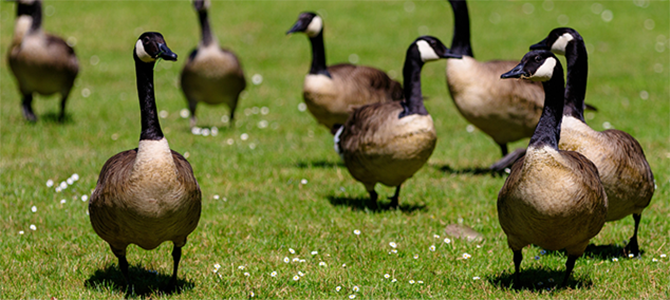
 Help keep Vancouver’s Canada goose population in check
Help keep Vancouver’s Canada goose population in check
Canada geese are striking, resilient birds, as common in Vancouver as mountain views and strolls along the sea wall. But, while one or two nonchalantly stopping traffic is amusing, a thousands-strong flock causing damage to parks and public enjoyment is not.
With a booming population wreaking havoc on the city’s greenspaces, the Park Board is asking for your help in keeping their numbers in check.
Impacts
Due to an ideal habitat and lack of natural predators, Vancouver’s Canada goose population is growing, with negative implications including:
- Eating young grass in newly seeded fields and lawns
- Digging holes with their beaks around sprinkler heads when trying to drink water; causing tripping hazards and damage to irrigation systems
- Droppings on beaches, picnic areas, and sports fields ending up on sports equipment and causing people to slip
- Polluting outdoor swimming pools, beaches, spray parks, and water features
- Defecating on memorial benches
- Increased aggression during mating season
- Destruction of juvenile salmon habitat through consumption of protective sedge grasses in local estuaries
Canada geese have very inefficient digestive systems and produce a lot of excrement for their size compared to other species. They defecate on average every 12 minutes, presenting a significant challenge in cleaning up after them.
Humane approach
One of the most humane methods of population control is addling, which involves replacing newly laid eggs with previously frozen eggs. Once swapped, the goose settles back into the nest and eventually flies off when the eggs fail to hatch.
This approach is supported by the BC SPCA and People for the Ethical Treatment of Animals (PETA). Park Board staff are federally permitted to perform this activity by Environment Canada under the Migratory Birds Convention Act External website, opens in new tab and are trained to addle with minimal disturbance to the bird.
In the last decade, thousands of eggs have been addled by the Park Board, which not only reduces the number of new recruits to the population each year but all of their potential descendants as well.
Ultimately, the success of the program is dependent upon the public’s support in reporting nests. Geese have adapted to the urban landscape by nesting in spaces far above ground—typically balconies, ledges, and rooftops.
Residents are urged to keep an eye out for signs of nesting geese. A single alert or aggressive goose that is standing in the same area day-after-day, at either ground-level or roof-top, is a strong indicator that a nest may be nearby.
Please report nests online, call 3-1-1, or email [email protected].
Please do not feed
Supplemental feeding is another major contributor to a larger population. Not only is unnatural food bad for their health, but feeding causes geese to congregate and defecate in high-traffic areas and popular parks.
Feeding by humans can also contribute to geese being able to lay more than one clutch per season; meaning that if one clutch does not hatch, they can replace it. In nature, without food from humans, this wouldn’t happen.
As a reminder, wildlife feeding is prohibited across all Vancouver parks and beaches and will incur a fine of up to $500.
Report wildlife feeding immediately by calling 3-1-1 or using the Van311 app.
About Vancouver’s Canada Geese
Today’s population are descendants of several different subspecies of Canada geese, introduced to Vancouver in the 1960s and 1970s to enhance wildlife viewing and hunting.
Now, several thousand Canada geese live in the city, congregating in areas where grassy clearings meet the shoreline such as Stanley Park, English Bay, and Sunset Beach, Trout Lake, along False Creek, as well as Van Dusen Botanical Garden.